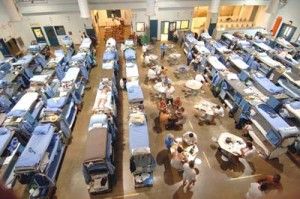California’s prison guards lock up reforms
May 21, 2013
After being threatened with contempt by a panel of federal judges for failing to sufficiently reduce the number of prisoners in California’s jails, Gov. Jerry Brown reluctantly unveiled a plan this month to further reduce the Golden State’s overcrowded prisons by another 9,000 inmates. Enthusiasm in Sacramento was in short supply.
Brown argued that court orders were forcing him to jeopardize public safety by transferring prisoners to county jails and offering some of them early release.
Prisons chief Jeffrey Beard was more direct, “The plan is ugly. We don’t like it.”
Two years ago, California’s prisons held twice the number of inmates they were designed to hold, and that led to serious problems. In 2011, the U.S. Supreme Court ruled in Brown v. Plata that California was violating prisoners’ Eighth Amendment right against cruel and unusual punishment. The Court estimated that an inmate in California’s prisons died every six to seven days due to inadequate medical care caused by overcrowding.
Suicidal inmates were forced to stand in metal cages for 24 hours without access to restrooms. California was ordered to reduce inmate populations over two years from 150,000 to 110,000. When Brown said this January that California had done enough to satisfy the court’s requirements, he was threatened with contempt unless he continued reducing prison rolls down to the mandated target.
Three strikes
How did California’s prisons get so crowded in the first place? Golden State voters contributed to this crisis by approving some of the most stringent sentencing measures in the nation, including the 1994 Three Strikes Initiative, Proposition 184. The law mandated 25-years-to-life in prison for three-time felons, even if the third “strike” was a nonviolent crime. Strict sentencing laws enjoy bipartisan support in Sacramento. Republican legislators exult in preaching a tough-on-crime mantra — especially to the older, white demographic that tends to vote for them. And Democrats are surprisingly among the loudest voices calling for tougher sentencing laws lest they be called-out for being soft on crime.
Enter the California Correction Peace Officer’s Association, CCPOA, better known as the prison guards union.
Thanks to the mandatory dues paid by its members, the union raises about $23 million a year, and spends about $8 million of it on lobbying. According to Joan Petersilia, a longtime observer of California’s correctional institutions, CCPOA’s lobbying goal is simple, “More prisoners lead to more prisons; more prisons require more guards; more guards means more dues-paying members and fund-raising capability; and fund-raising, of course, translates into political influence.”
And what does that influence lead to? Outrageous paychecks, for one thing. The average annual salary for prison guards nationally is about $45,000. California’s prison guards, however, pocket a cool $72,400 — 60 percent above the national average. But that doesn’t even take overtime pay into account. Once that’s factored in, California prison guards often make more than $100,000 per year. California’s governors routinely push these pay increases through an obliging Legislature.
The union has been one of the leading backers of tougher sentencing laws. It spent more than $100,000 to pass the original Three Strikes law. It dropped another $1 million in 2008 to defeat Proposition 5, which would have reduced sentences for nonviolent crimes and allocated more resources to treating drug addiction.
And it spent more than $1 million in 2004 to beat Proposition 66, which would have reduced the number of crimes that carry mandatory life sentences.
Politicians
Politicians are also on the menu. CCPOA spent nearly $2 million supporting Brown’s 2010 gubernatorial campaign. The Legislature is a special beneficiary. Operating on the principle that the surest way to win a race is to bet on all the horses, as of Dec. 2012 the union had contributed campaign funds to every current state senator in California.
With all its influence and off-the-charts pay levels, you might think that California’s prison guards are among the nation’s best at what they do.
A two-volume report was issued last month by the independent Office of Inspector General detailing more than 117 cases of prison guard abuse in painstaking detail. Examples include guards planning prisoner assaults and murder, buying prisoners drugs and alcohol, groping and grappling prisoners and soliciting sex from prisoners — including juvenile prisoners.
The investigators accused the corrections department of sweeping these offenses under the rug. But with so many contributions to politicians, what’s the likelihood that any real reform will happen? Is it any wonder that between the humanitarian crisis caused by overcrowding, reduced funding for rehabilitation programs, and rank abuse by the very people entrusted to manage prisons, California’s recidivism rate is the highest in the nation — nearly double the average of all other states?
Smuggling
To show just how much power the prison guards union has in Sacramento, consider one of the topics covered in the inspector general’s report: smuggled cellphones used by prisoners to run drugs and plan new crimes. According to a legislative analysis in 2010, the main source of smuggled cellphones is — you guessed it — prison guards.
In response to demands for employee searches, the union cited a work requirement that its members be paid for any increase in “walk time” — the minutes it takes for guards to get from the front gate to their posts behind prison walls. Going through airport-style metal detectors, which require the removal of shoes, belts, and other items, easily could double that walk time, which would allow prison guards to collect an additional several million dollars of pay per year.
That’s right: prison guards would financially benefit from the inconvenience of having their illegal activities halted. Last year, 20 prison guards were fired or allowed to resign over the cellphone scandal, but neither Jerry Brown nor the Legislature openly challenged the absurdity of “walk time.”
Some will see in all this a vindication of their preconceived notions about unions. But privatization offers no easy cure, either. Consider a proposal floated last September by Correctional Corporation of America. Cash-strapped states would receive upfront payments of $250 million from CCA, which would purchase and run their prisons. In return, the states would guarantee CCA a 90 percent minimum occupancy rate in these prisons for at least 20 years.
The proposal was rightly blasted by watchdog groups, which pointed out that such a deal would create perverse incentives for lawmakers to pass California-style sentencing laws across the nation not to protect public safety, but to keep the money flowing by throwing as many people behind bars as possible.
Whether the beneficiary is a public sector union like CCPOA, or a private company like CCA, the profit motive creates dangerous incentives when combined with prisons. America imprisons more people than any other country, and California imprisons more people than any other state. Instead of coming up with new ways to tie profits to prisoners, we should be looking for ways to reduce the number of people behind bars.
Rehab
A good place to start is allocating funds away from guard salaries and new prison construction and into drug rehab programs to reduce recidivism. We should modify laws like Three Strikes, and legalize relatively harmless drugs like marijuana.
A step in the right direction was Proposition 36, which voters approved last November. It changed the law to impose a life sentence only when the third strike was “serious or violent.”
The outrageous salary increases and job protections the union has obtained should be overturned — by ballot measure, if necessary. The sanctity of contracts is all good and well, but despite this year’s balanced budget, California is still in a fiscal crisis from the pension crisis and other problems. If the people deem the continuance of such contracts to be against the state’s interest, they have the right to cancel them.
The union has learned to keep quiet in the latest round of debates, possibly because it fears becoming the target of a Scott Walker-style movement. But that doesn’t mean it has suddenly decided to pack it in. It is simply biding its time, waiting for the furor to subside before it goes back to business as usual.
(Many thanks to Tim Kowal for helping me understand some of the issues surrounding California’s broken prison system. Check out his blog to learn more.)
Sagar Jethani is a global marketing executive who studied political science and philosophy at Loyola University of Chicago and business at UCLA Anderson. He lives in Woodland Hills, California. This article is cross-posted from PolicyMic.
Related Articles
Steve Maviglio, pension sage: Why it’s a laughable spectacle
April 2, 2013 By Chris Reed Steve Maviglio, a leading consigliere to top Sacramento Democrats for more than a decade,
Leland Yee becomes 3rd Democratic state lawmaker to face criminal charges
A prominent Democrat state lawmaker and candidate for Secretary of State was arrested Wednesday morning as part of a massive
High-Speed Revolving Door
Anthony Pignataro: You don’t have to watch politics very long before you see that top people move more or less




